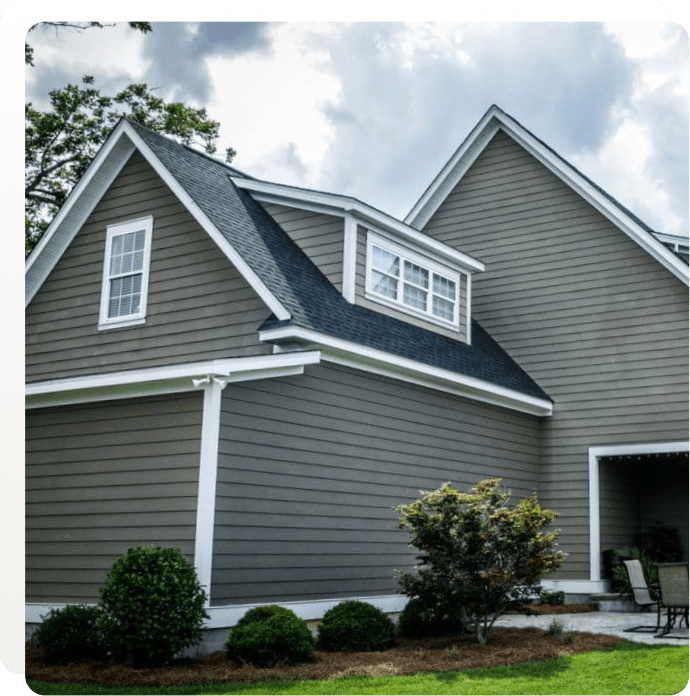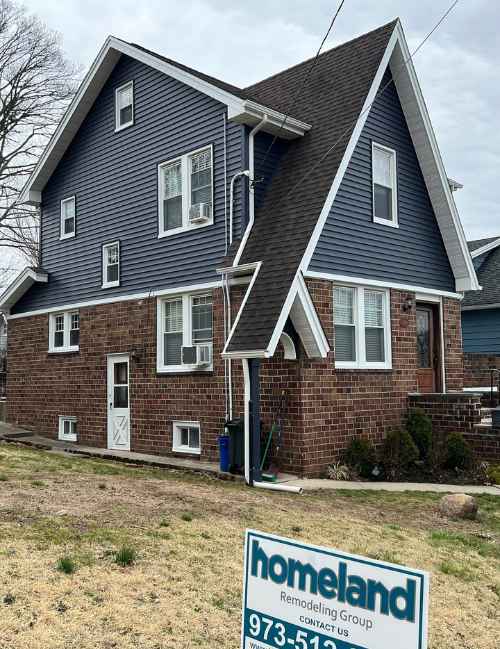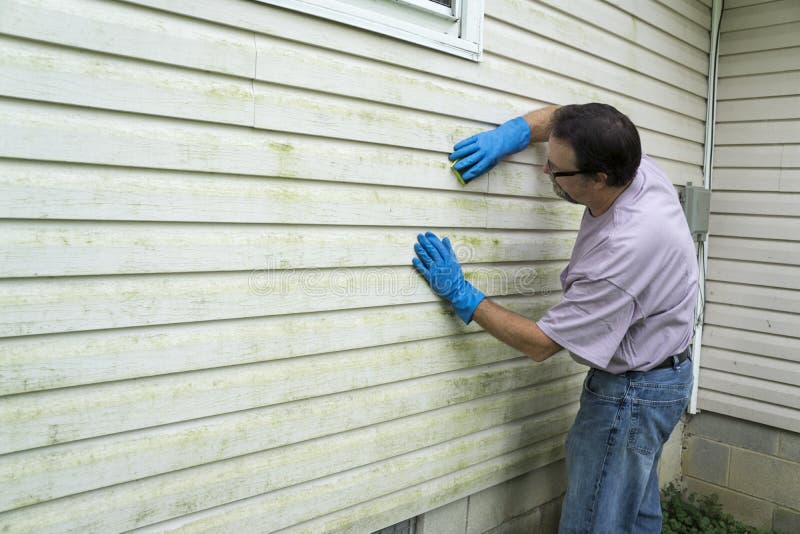The Crucial Overview to the Various Types of Home Siding and Their Special Advantages
In the world of home enhancement, selecting the right exterior siding is an essential choice that affects both aesthetic charm and useful efficiency. The variety of materials readily available, such as wood, vinyl, fiber concrete, block, and metal, each deal distinct benefits that accommodate different demands and preferences. Recognizing these distinctions can substantially enhance the durability and value of a residential or commercial property - morris siding contractor. However, with many alternatives to think about, which house siding material absolutely sticks out for your details project? Checking out these choices can bring about informed decisions that align with both design and functionality.
Timber Exterior Siding
Timber home siding, a prominent selection for domestic exteriors, offers a timeless aesthetic that combines natural appeal with structural stability. This home siding material is readily available in various designs, consisting of clapboard, shingles, and board-and-batten, enabling house owners to tailor their façade to match their style choices. Wood exterior siding is normally crafted from sturdy types such as cedar, redwood, or want, which are known for their durability and ability to endure ecological stressors.
Among the main benefits of timber exterior siding is its excellent insulation homes, which can add to energy effectiveness and lower home heating prices. Additionally, wood siding is naturally degradable, making it an eco pleasant choice when sourced sustainably. Regular upkeep, including paint or staining, can lengthen its lifespan and boost its look, allowing house owners to preserve the all-natural appeal of the timber.
However, potential disadvantages include vulnerability to parasites, rot, and weather damage, necessitating adequate therapy and maintenance - morris siding contractor. Regardless of these problems, when correctly looked after, wood siding can provide a durable and attractive solution that boosts the personality of a home while providing a warm, welcoming environment

Vinyl Siding
Vinyl house siding has actually become a leading choice for house owners seeking a low-maintenance outside alternative that incorporates toughness and price. This versatile material is crafted from polyvinyl chloride (PVC), making it resistant to numerous climate condition, including wetness and UV rays. Therefore, plastic siding does not warp, rot, or discolor, guaranteeing durable visual charm.
Among the main advantages of plastic house siding is its comprehensive variety of designs and shades, allowing home owners to achieve the desired seek their residential or commercial property without the demand for frequent repainting. Additionally, vinyl home siding is easy to install, which can considerably reduce labor costs throughout building and construction or restoration tasks.
Vinyl exterior siding also contributes to power effectiveness. Numerous options attribute insulation backing, which boosts thermal efficiency, aiding to keep comfortable indoor temperature levels and possibly decreasing energy expenses. Its smooth surface promotes very easy cleansing, calling for just regular washing with a garden pipe to eliminate dust and debris.
Fiber Cement Siding
Fiber cement home siding has gained grip amongst homeowners and contractors alike because of its exceptional combination of toughness and aesthetic adaptability. Composed of a blend of sand, cement, and cellulose fibers, this exterior siding option is engineered to hold up against extreme weather, navigate to this website including high winds, heavy rain, and temperature variations, making it a resilient selection for residential exteriors.

Among the key advantages of fiber cement home siding is its resistance to parasites, such as termites, and its non-combustible nature, offering improved fire safety and security. morris siding contractor. Furthermore, it is available in a large array of designs, structures, and shades, permitting house owners to accomplish their desired visual without compromising performance
Another advantage is its reduced upkeep needs; fiber cement siding normally requires paint or discoloration every 5-10 years, which is much less frequent than other products. Its longevity adds to a lower total expense of possession, as it lowers the requirement for constant repair services or substitutes.
Ultimately, fiber cement house siding represents an excellent investment for those seeking a resilient, eye-catching, and versatile outside option, integrating both kind and function to enhance the home's aesthetic allure.
Steel House Siding
The appeal of metal exterior siding lies in its robust durability and modern-day visual charm, making it a preferred selection for modern architecture. Readily available in materials such as light weight aluminum and steel, metal siding uses a variety of finishes and shades, permitting property owners to achieve a customized appearance that matches their layout vision.

Power performance is an additional considerable advantage, as numerous steel house siding products are developed with insulation choices that assist manage indoor temperatures. This can cause minimized energy expenses over time. Furthermore, metal home siding is typically recyclable, making it an eco-friendly selection for sustainability-minded property owners.
The installation procedure for steel exterior siding can be reasonably uncomplicated, leading to a quicker turnaround time for construction projects. On the whole, steel siding incorporates functionality and design, making it a sensible option for those seeking a long-lasting and aesthetically enticing outside surface.
Block and Stone Home Siding
Brick and stone house siding sticks out as an ageless option that boosts the visual beauty of any kind of home. Understood for their durability and low maintenance, these products offer a remarkable roi while raising the home's aesthetic charm. Readily available in different colors, textures, and patterns, brick and rock can be tailored to fit diverse building designs, from conventional to modern.
Among the main advantages of block and rock house siding is their energy effectiveness. Both materials have natural shielding properties that help regulate indoor temperatures, potentially minimizing cooling and heating costs. Furthermore, they offer remarkable Web Site fire resistance compared to various other siding alternatives, adding to boosted security.
One more advantage is their durability. Brick and rock can last for years, often calling for minimal maintenance beyond periodic cleansing. Unlike timber home siding, they are unsusceptible insects and rot, making certain a resilient outside that endures the you could try this out aspects.
Verdict
In summary, the choice of siding substantially affects a home's aesthetic appeal, energy effectiveness, and maintenance demands. Each sort of siding-- whether timber, plastic, fiber metal, concrete, or block and rock-- offers distinct advantages customized to different house owner preferences and ecological conditions. Comprehending these choices makes it possible for educated choices that boost both the longevity and visual beauty of household exteriors. Eventually, choosing the best siding is essential for attaining an equilibrium in between performance and layout in domestic architecture.
One of the primary benefits of wood exterior siding is its outstanding insulation residential or commercial properties, which can contribute to power effectiveness and lower heating costs. In addition, timber siding is biodegradable, making it an environmentally pleasant option when sourced sustainably.One of the key benefits of metal home siding is its resistance to various environmental aspects.Energy performance is one more significant advantage, as numerous metal siding items are made with insulation alternatives that help control interior temperature levels. Each type of home siding-- whether wood, vinyl, fiber metal, cement, or block and stone-- provides distinct advantages customized to various house owner choices and environmental conditions.